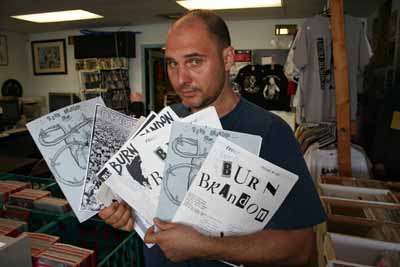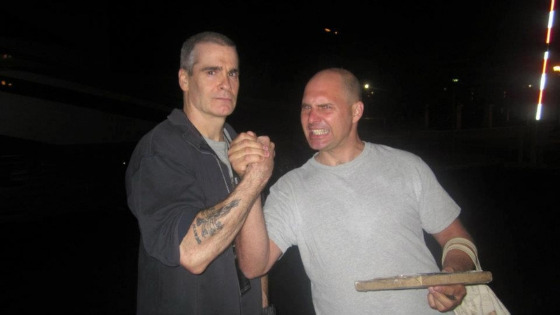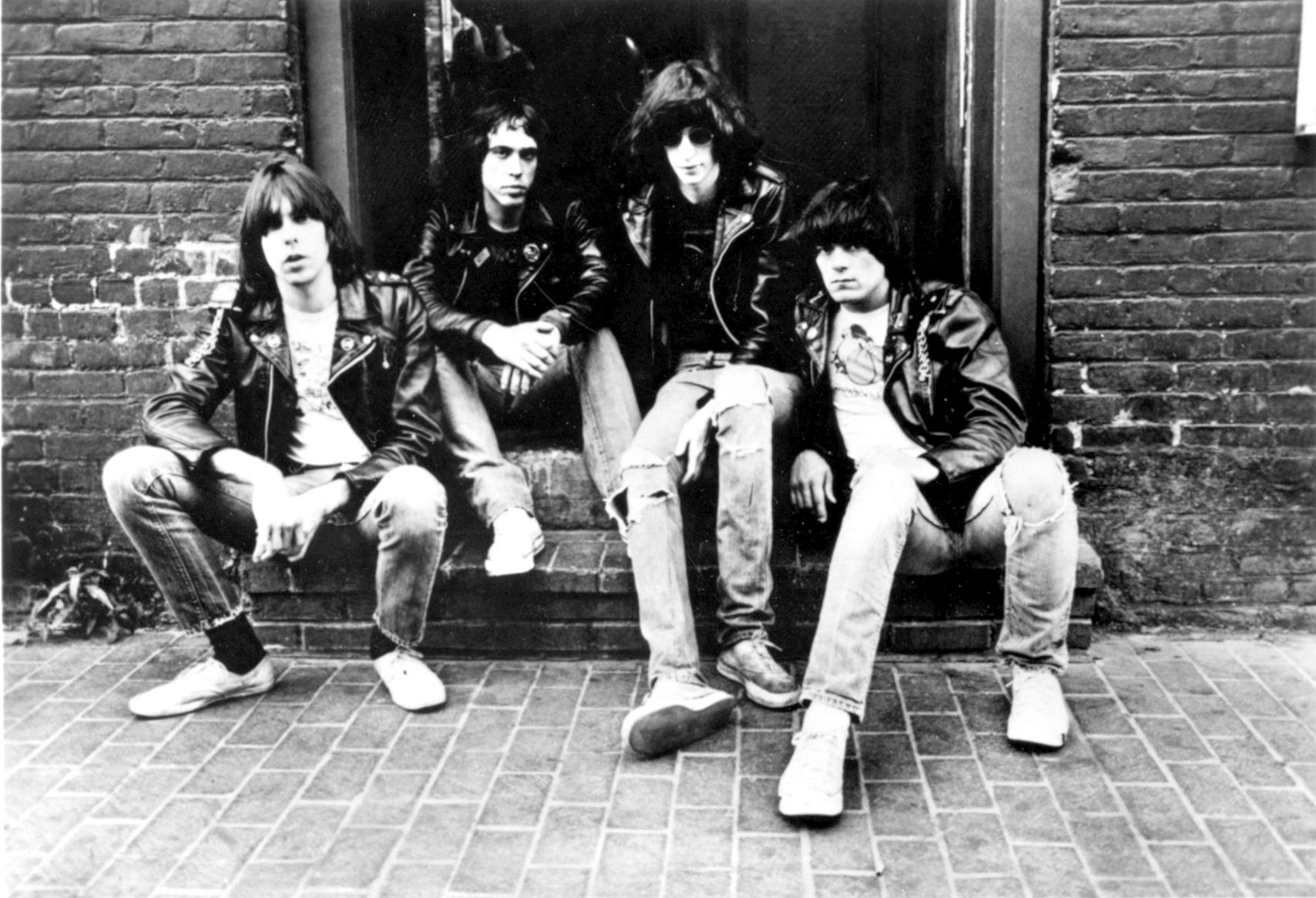An interview with Bob Suren
 Bob Suren’s book, Crate Digger: An Obsession with Punk Records, comes out on June 8th, and advance copies have been immediately charming everyone in sight. The kickstarter-funded book captures the ups and downs of Bob’s life as a legend of Florida’s hardcore scene and a bellwether of the changing music industry.
Bob Suren’s book, Crate Digger: An Obsession with Punk Records, comes out on June 8th, and advance copies have been immediately charming everyone in sight. The kickstarter-funded book captures the ups and downs of Bob’s life as a legend of Florida’s hardcore scene and a bellwether of the changing music industry.
Be sure to check out Bob’s youtube channel for priceless Florida hardcore moments of years past. You might also be able to catch him on tour this July if you live…well, just about anywhere in the southeastern, mid-atlantic, or central parts of the US. Best yet, he’s recording an audiobook of Crate Digger, and many bands discussed in the book have given permission to include their music.
1. Lore is that Crate Digger started as a series of Facebook posts. How did those eventually turn into a book?
A: One of my friends, Shane Hinton, who is 14 years younger than me but a gifted writer and college writing professor, told me that the stories were too good to just be Facebook posts. He told me I should turn it into a book but I didn’t think I had enough stories in me and I didn’t know how to organize it. Shane gave me the idea to organize it as a record collection, with the stories in alphabetical order according to the record titles that they go with. I thought that was clever. For a few months, I only wrote once or twice a week, 300 to 1,000 words at a time. Then The ideas started pouring in and I had to keep a list of everything I wanted to squeeze in. Then almost every day after work for a couple of months, I’d try to write a chapter and it came together really fast. Maybe three months of casual writing and then two or three months of hustling. I got exciting as I saw the ideas getting crossed off my list and the writing went faster. The last day I wrote, when I saw the end was in sight, I wrote nearly 8,000 words. That was Easter Sunday 2012.
Then came the hard part—trying to find a home for it. For about three or four months, I tried big publishing houses and agents. I did get some positive feedback but no offers. Then I gave up for about four months. Then a friend laid out all the text for me like a book, with graphics and formatted pages. That got me really excited and I started looking for a publisher again. For the second time around, I decided to go after indie publishers and made a short list of about ten. The publisher I really wanted ignored me, which I thought was rude. Then I skipped a few names down the list and tried Microcosm Publishing on my fourth or fifth day of the renewed search. Joe was into it right away. After just a few emails, maybe just 90 minutes times, I was looking at a contract. He had only read two sample chapters. I asked him if he wanted to read the whole book first and he said no. By the time I flew to Portland in Aug. 2014 for the final edit, Joe had only read about half the book. He read the second half for the first time with me right by his side. The editing process was fast and easy. I think we only lost about six pages from the original text, mostly redundancies. I was expecting to bang heads, but the editing process made for a stronger book.
2. The book is organized alphabetically—is that how you used to organize your record collection?
A: When I only had a handful of records, I kept them in the order I bought them, with new stuff up front and old stuff in back. Eventually, this method made it too hard to find what I wanted so I went to alphabetical. I used to keep all the unheard stuff in a small stack on my desk until it got cleaned and listened to once or twice before shelving. I once had a job at a public library. To get the job, they made me alphabetize a bunch of books and put a bunch of books in order by Dewey Decimal. I think it was 40 books in all, all scrambled. They said I had the fastest time ever. I think I did it in less than two minutes. They didn’t know about Sound Idea, the dustiest but most well-organized record store of all time. Even the T-shirts and stickers were alphabetized.
 3. Fan response to your book has been tremendous—do you have any stories to share about how people are reacting?
3. Fan response to your book has been tremendous—do you have any stories to share about how people are reacting?
A: Yes, I have been getting lots of emails from old friends and people I never met telling me that the book touched them, that they can relate to it. I just got a long email today from a guy I never met who had some of the same experiences. I think what makes a good book or a good song is that it is relatable. That’s why all those old blues songs still make people feel good, because the listener knows he’s not all alone. So, there are a lot of relatable stories and a lot of universal themes, what I like to call the Big Stuff. I wanted to put in a lot of the Big Stuff so that even people who don’t know the music can understand. My 70 year old co-worker told me that she didn’t know anything about punk but she went through all the Big Stuff, too. That’s exactly what I wanted to do.
And, of course, there are stories so bizarre that they could have only happened to me. Yesterday a guy asked me if the story about the FBI agent is true. Yes, every bit of this book is absolutely true. A lot of people from my past have found me on Facebook recently and ordered the book. That’s been kind of odd but cool.
4. You’ve been navigating the music industry as it’s gone through some massive changes. What do you think is the next big thing? Or, if different, what do you hope it will be?
A: I don’t really follow the industry anymore and I am kind of clueless. I never was good at gauging trends. I could never figure out why some bands were big and others weren’t. I just followed my heart and did things the way that felt right. Some of that was successful and some of it was not. I wish good luck to all the bands, labels, distributors and record shops out there. Vinyl is huge again. I didn’t see that coming. I have no idea how long that will last, but most of the people in music are my kind of people and I wish them well. I just don’t want to crunch numbers any more and play the public relations game. I barely even want to go to shows anymore. I go to shows to talk to my friends between bands. I don’t pay much attention to what is on stage, to tell you the truth. I’m not jaded, I am just more interested in other things. If you give me the choice between a three band punk show or bowling, I’ll take the bowling. It’s new ground for me. I’m no longer interested in treading water.
5. What’s the next big thing for you?
A: Oration is going to be part of my life, reading dates and freestyle talking. I have been playing around with the idea of stand up comedy, too. And I have been writing a lot of poetry which I bet already has people laughing but I don’t care. I am not writing it for them. I’m finding poetry a great way to express myself in short bursts with no limits. I’m also very excited about recording the audio book version of Crate Digger because that’s something I have never done. New territory excites me. Ask me if I want to make a quilt and I am going to say yes because I have no idea how to make a quilt. I want to get into voice over work and maybe acting if I can get a foot in the door. That’s a whole new world that I know nothing about and I may be terrible and I may hate it, but I sure want to try.
This has been an interview with Bob Suren, author of Crate Digger. It’s part of a series of interviews with Microcosm’s writers. The last one was with Why We Drive author Andy Singer. The next is with Consensuality author Helen Wildfell.

 If you call or visit
If you call or visit 